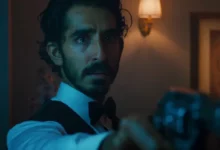How “Civil War” and Other Films Can Help Defeat the “Outrage Industrial Complex” and Start Vital Conversations
In the shadow of a divided nation, we saw a unique moment of unanimity as millions of Americans united to see the breathtaking solar eclipse. In the same week as the bookends? the action-thriller “Civil War,” which is now the top movie in America and A24 Films’ most commercially successful release to date,. The movie, which is set in an imagined second American Civil War, follows photojournalists under the direction of Lee Smith (Kirsten Dunst) as they document the atrocities of a failing nation.

I became obsessed with the narrative gaps that director and writer Alex Garland left in the picture after seeing a preview. Garland purposefully leaves out details in order to leave viewers wondering what brought us to this point of no return and to leave it up to them to fill in the rest.
How we fill those holes important, in my opinion. Large-scale movies like these, particularly ones on radioactive subjects, create a story in our minds. Politics comes after culture. It touches a nerve to release the movie “Civil War” just before the most contentious election of our time. It affects our perceptions of and interactions with our institutions as well as with one other.
The dystopian portrayal in the movie seems frighteningly prescient when I think about the broader tendencies in our nation, where fear-mongering rhetoric and ideological silos are driving wedges between people. According to a 2022 survey conducted by YouGov and The Economist, 40% of Americans think that a new civil war is “at least somewhat likely” to break out in the next ten years, and some even suggest that we may already be in a cold war. It was only a matter of time before our poisonous political culture was shown in a film similar to “Civil War.”
But long-standing structures in politics, entertainment, and the media exaggerate a culture of disdain, obstructing the real ties that really unite Americans. There is a “perception gap,” according to research by More in Common, which demonstrates that we are not nearly as separated as we are made to think. According to 79% of Americans, if given the chance, they would contribute to closing socioeconomic gaps.
The greatest question seems more horrifying than the movie itself, based on discussions I’ve had with the director, the actors, and many moviegoers: What should we do once we’re “scared as hell”? What steps ought we to take?
In actuality, people lose hope when the tried-and-true solutions—from the local and personal to the national and systemic—do not get enough attention. That is something we must alter. The following are the top three tactics to prevent a second American civil war:
Building Bridges across Differences: Creating bridges across disagreements may help you comprehend a subject better and even mend fences with friends and family. Consider creating bridges in the same way that jazz musicians do art: by assembling a varied group, riffing on ideas, and listening with open minds. Ask questions with the goal of learning while riffing. Actor Wagner Moura of Civil War fame said on CBS Sunday Morning, “I’m really trying to sit down and listen to people that I disagree [with] now.” And I found a lot of common ground if you love democracy, which really shocked me.
Although the bridging muscles in our society are weakened, we may still use them by exercising them in the area of cultural experiences before moving on to politics. For instance, Americans from various backgrounds contributed to the success of basketball player Caitlin Clark and the NCAA women’s March Madness championship game, which broke attendance records. Sports are a fantastic way to bring people together and may serve as a springboard for re-humanizing Americans who may not agree on other issues. Celebrating shared cultural events strengthens the ties that our society needs to advance both locally and nationally.
Increase Your Media Selection for Richer Narratives: Garland is correct to emphasize the importance of journalists to democracy. However, how we consume that journalism—which often provides dopamine spikes and red meat to support your biases—has a significant influence on whether or not we further divisiveness in the United States. Diversifying media intake is crucial for civic well-being, just as eating a diversified diet is important for physical health.
Avoid becoming trapped in social media echo chambers by being aware of their algorithms. In order to promote a more complex perspective of our world, actively seek out varied voices from our coastal cities to middle America, from the left and right, establishment and independent. Investigate more recent platforms that aim to counteract media polarization. News Not Noise and AllSides.com, run by former CNN top White House Correspondent Jessica Yellin, are two fascinating examples.
Reform the Outrage Industrial Complex: We must also keep in mind that our divides are a source of wealth for long-standing structures. The untidy little secret is that the majority of Congressmen are sensible and kind off-camera, but vile in public. We can fight the outrage industrial complex by pushing for structural adjustments. Encourage the implementation of open, nonpartisan primaries and ranked choice general elections, as seen in Alaska, to encourage political candidates to target the “exhausted majority,” or a wider voter base. Regaining people’s faith in our institutions will need us to provide outcomes rather than inflame resentment.
Upon the conclusion of Civil War, we are faced with a crucial decision: either we choose to remain obliging spectators of a possible future or we actively participate in creating a new direction. It is up to us whether or not we direct our efforts toward the practical measures intended to avert a second civil war. Moreover, rather of sustaining the cycles of dehumanization, leaders in politics, entertainment, and the media should decide to emphasize how we can connect across differences. Together, we have the power to swap out the weapons of self-destruction for a robust democracy’s open arms and minds. We have the power to rewrite both our own and American history.






